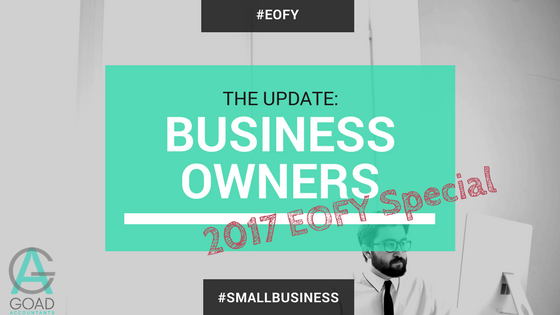Your End of Financial Year Checklist
Its almost the end of another financial year and now is the time to tick off the final few tax time items. Here is your end of financial year checklist –
1. Pay your Employee Super pre-30 June.
Super is deductible when paid and paid by the quarterly due dates. The June 2017 superannuation contributions are due by 28th July 2017, however to get a tax deduction for them this financial year they need to be received by the super fund’s by 30 June 2017.
To ensure they reach the super fund’s by 30 June, we recommend you transfer funds via the super clearing house by Tuesday 27th June 2017.
2. Additional Super Contributions
Consider making additional super contributions for directors or principals. The concessional contribution cap for the 2016-17 financial year is reducing from $30,000 (49yrs & under) and $35,000 (50yrs & older) to just $25,000 from 1 July 2017. So if you have the available cash in your business & want to top up your super, consider bringing your concessional contributions up to the applicable threshold.
Please note – a review of your super balances, age and assessable income components should be done prior to making additional contributions.
The Concessional Contribution Cap is reducing to $25,000 from 1 July 2017.
3. Purchase any Plant & Equipment
The $20,000 instant asset write-off for Small Business entities has been extended another year to 30 June 2018. But if you are looking at purchasing a new motor vehicle or equipment in the next few months, it might be beneficial to bring forward that tax deduction to this financial year.If paid before 30 June, you may also be eligible to claim the GST input tax credit on your June 2017 BAS.
4. Bring forward Expenses
Looking forward over the next few months – consider what expenses you could bring forward to this month. Work vehicle services due, repairs to office equipment or time to replenish the business cards & stationery?
Make sure you obtain an invoice dated at least 30 June 2017 to be able to claim a tax deduction this financial year. .
Want to maximise your Motor Vehicle expense claim?
5. Keep a Log Book
If you haven’t started your logbook, now is the time. The logbook should be commenced before 30 June and kept for 12 weeks. A logbook is only required every 5 years.
Grab a logbook from the newsagents or download one of many logbook apps. As long as you are recording the basics –
– Logbook date commenced & end
– Opening & closing odometer readings
– Total Kms travelled during the period
– The date, # KMs travelled, reason and open & closing odometer for each journey
– The opening & closing odometer reading for the start & end of the financial year (for every year)
6. Put payment arrangements in place for all Outstanding ATO Debt
Changes to reporting of outstanding income tax debts over $10,000 comes into effect on 1 July 2017. This means all debts that haven’t been sufficiently dealt with (i.e. a payment arrangement in place) will be reported to credit agencies. This may have a negative affect on your lending capacity. We recommend reviewing your outstanding liabilities & putting arrangements in place if balances can not be repaid in full.






